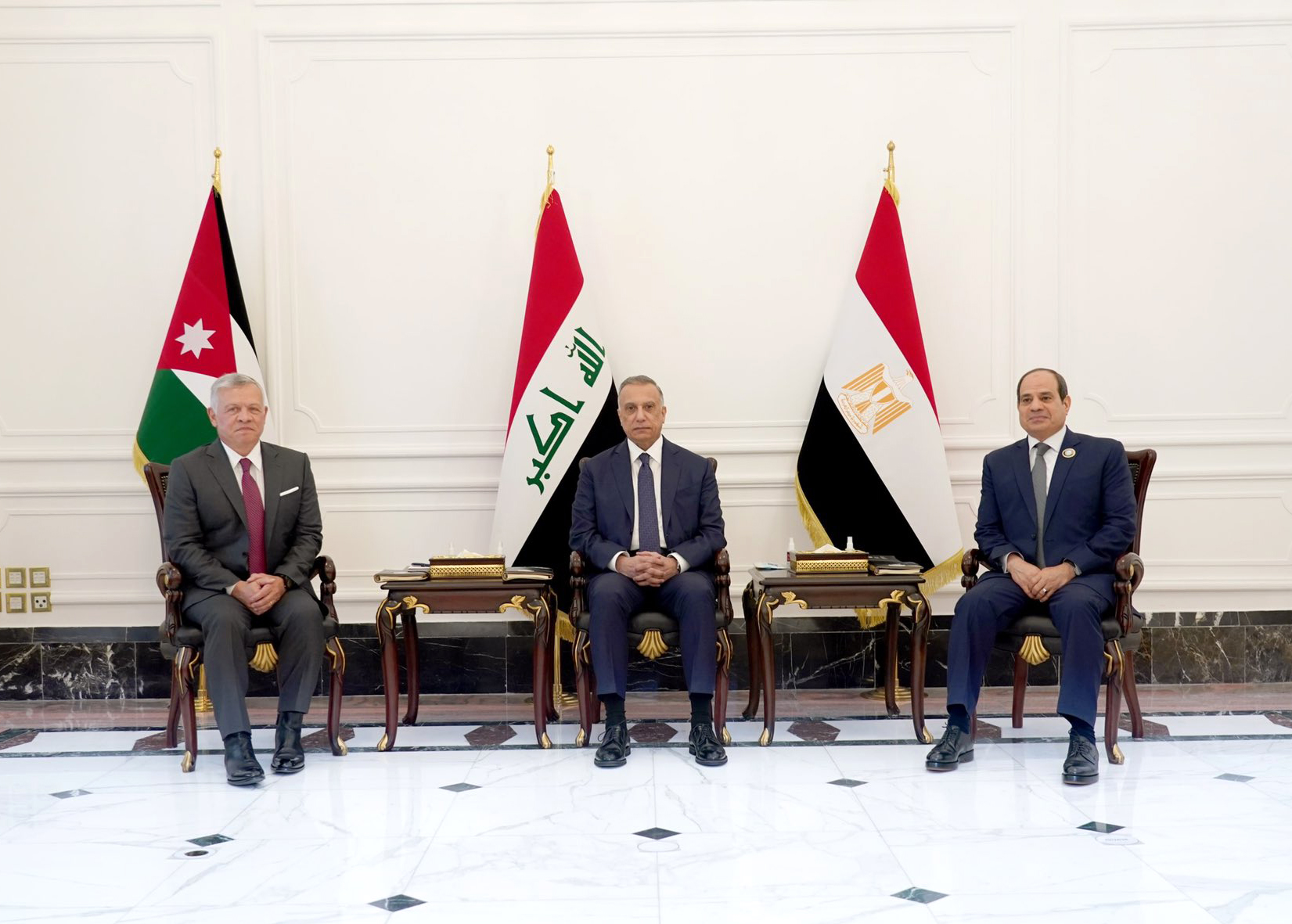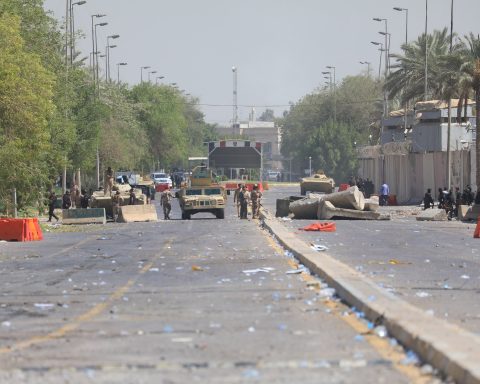Due to the recent changes and transformations in both the regional and international political systems in the Middle East, there have been new developments at the level of alliances and partnerships, one of the most important being the possibility that the recent high-level contacts between Iraq, Egypt, and Jordan will turn into a political and economic partnership. Egypt has been experiencing economic difficulties under the rule of Abdel Fattah el-Sisi, Jordan’s political leadership has been going through threatening periods, and Iraq is seeking a way out of a series of sectarian, economic and social problems, as well as the repercussions of the tensions with the US and Iran; and consequently, the three countries are taking certain steps aimed at developing the said tripartite partnership.
At the tripartite summit between Iraq, Egypt, and Jordan, at the level of leaders held in Baghdad in the last days of June, the parties signaled their determination to further develop relations, and concrete steps were taken to achieve this goal.
Economic priorities come first
Within this framework, a summit was held between Iraq, Egypt, and Jordan in the last days of June. The fourth summit since March 2019 was groundbreaking in many aspects. The visit of Egyptian President el-Sisi to the Iraqi capital of Baghdad to attend the tripartite summit is a clear indication of the level of political and diplomatic relations and the importance attached to this recent alliance, as it is the first time in almost 30 years that an Egyptian leader has visited Iraq. The fact that Iraq’s Prime Minister Mustafa al-Kadhimi and President Barham Salih welcomed the President of Egypt and King Abdullah II of Jordan together is also significant in terms of the importance Iraq attaches to its relations with Egypt and Jordan.
Cairo, which wants to implement new initiatives in its foreign policy with the aim of overcoming the fragilities in its domestic politics and economy, has taken steps toward partnership and cooperation with many countries, including normalization with Turkey. As is the case with the process of change and transformation in other partnerships and alliance formations in the Middle East, the repositioning and redefinition of interests between Iraq, Egypt, and Jordan is closely related to international developments, the most important being the repercussions of US policies toward the Middle East under the presidency of Joe Biden. The fact that the US resorted to diplomacy instead of economic and military means against Iran under the Biden administration paved the way for the policy of supporting the improvement of relations between Arab countries by Washington.
In evaluating the latest developments in the region, it is necessary to keep in mind that this recent rapprochement has a historical basis.
The tripartite summit between Iraq, Egypt, and Jordan is important for Cairo in many aspects. In the early 1990s, the relations between the two countries entered a period of serious deterioration when Egypt joined the United Nations (UN) coalition that drove Iraq out of Kuwait. Egypt acted with its traditional ally, the US, at the expense of its relations with Iraq, which is one of the most important actors in the Arabian Peninsula. Bilateral relations continued mainly in this direction until the invasion of Iraq in 2003. While the political relations gradually improved after the Saddam Hussein administration, which was overthrown as a result of the US invasion of Iraq, the process further accelerated in order to develop economic relations. On the other hand, Jordan also gave impetus to the improvement of relations between Egypt and Iraq. While the three countries have frequently exchanged views on regional issues since 1990, especially in the post-2003 period, economy and trade stood out as the main motivations that brought them closer. This gradual rapprochement between the trio of Cairo-Baghdad-Amman since 2003 was strengthened with the summit held in Jordan’s capital of Amman in August 2020.
The summit in Amman was attended by King Abdullah II of Jordan, Egyptian President el-Sisi and Iraqi Prime Minister al-Kadhimi. At the summit, the representation of Egypt and Jordan at the presidential level and Iraq at the prime ministerial level was an indication of the potential of cooperation between the three countries, as well as their willingness to exchange views under a new partnership. The potential for the improvement of relations between the three countries and the fact that the meeting was about Israel’s attacks on Palestine led to the discussion of whether the Cairo-Baghdad line could create a common sphere of influence on fundamental issues in the Middle East. After the summit in August 2020, the three countries issued a joint statement in which it was emphasized that cooperation would be enhanced on various issues ranging from economy to security and from health to education. Beyond political and diplomatic relations, it was quite important that Amman, in addition to the Cairo-Baghdad line, also called on Israel to put an end to the annexation of Palestinian territories and to comply with the Arab Peace Initiative introduced in Lebanon in 2002. In addition to their efforts to strengthen relations among themselves, the three countries adopted a common stance toward the Palestinian issue with the aim of achieving normative gains in the eyes of the Arab peoples.
The possibility of a tripartite partnership increases after the Baghdad Summit
In the statement issued after the summit held in Baghdad in June 2021, it was indicated that a series of steps were taken such as strengthening economic ties, sharing resources and doubling trade volumes. The three leaders also decided to strengthen the coordination between security and intelligence mechanisms in the fight against terrorism and cyber-attacks, and announced that they would act jointly against the activities of hostile elements including in social media. Egyptian President el-Sisi also held separate meetings with King Abdullah II and Iraqi Prime Minister Mustafa al-Kadhimi outside the tripartite summit. According to the statement of the Egyptian Presidential Spokesperson, during the private meeting between el-Sisi and the King of Jordan, the strengthening of bilateral relations and economic relations were discussed; and during the meeting with the Iraqi Prime Minister, views were exchanged on various regional issues as well as the strengthening of trade and economic relations. El-Sisi’s dynamism is another manifestation of Egypt’s recent activism in foreign policy. Cairo, which wants to implement new initiatives in its foreign policy with the aim of overcoming the fragilities in its domestic politics and economy, has taken steps toward partnership and cooperation with many countries, including normalization with Turkey.
The visit of the Egyptian President after 30 years has the potential to pave the way for many political initiatives. As a result of the frequent economic and political talks since March 2019, common points between the three countries have become more evident, and foreign policy outcomes based on a win-win formula are likely to emerge. The addition of Iraq to the already-strong alliance between Egypt and Jordan may be the harbinger of a period in which Cairo is re-asserting itself as a regional actor. However, it will not be easy for Egypt to overcome the said obstacles to becoming a decisive actor.
Increasing diplomatic contacts and dialogue between the three countries can yield positive results within the framework of the project of an oil pipeline planned to be built between Basra and Aqaba, which has been on the agenda recently. The project of a pipeline to be built between Iraq and Jordan, which was planned but could not be realized due to security problems, is considered as a potential source of oil by Egypt. It can be said that the Egyptian administration, which signaled that the expansion of the project to include Egypt was on the agenda during the tripartite summit talks, aims to create a new import opportunity for the country in addition to political rapprochement. Moreover, this is also a step for Egypt to expand its political influence in the Middle East.
It should be kept in mind that the dialogue of the three countries has a historical background. As a matter of fact, Egypt, Jordan, and Iraq had established an economic cooperation organization in 1989 called the Arab Cooperation Council (ACC), of which the-then North Yemen was also a member. Although the initiative was short-lived for many reasons besides Iraq’s invasion of Kuwait, it provides the Cairo-Amman-Baghdad line with a historical background. Iraq’s historical commercial partnerships particularly with Egypt and Jordan are among the main motivations for increasing contacts between the three countries. In addition to the commercial contacts, the improvement of socio-cultural relations between Iraq, Egypt, and Jordan, especially after the 1980s, was also influential in the emergence of a political consensus. Thus, in evaluating the latest developments in the region, it is necessary to keep in mind that this recent rapprochement has a historical basis.
The Turkish version of this article was published by Anadolu Agency on July 8, 2021.














